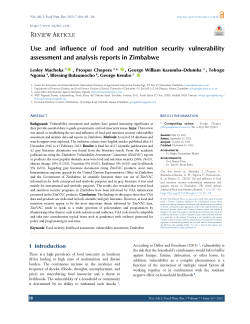Main Article Content
Use and influence of food and nutrition security vulnerability assessment and analysis reports in Zimbabwe
Abstract
Background: Vulnerability assessment and analysis have gained increasing significance as they provide essential data to guide governments on food insecurity issues. Aims: This review was aimed at establishing the use and influence of food and nutrition security vulnerability assessment and analysis data and reports in Zimbabwe. Methods: A total of 18 databases and search engines were explored. The inclusion criteria were English articles published after 31 December 2016 to 15 February 2022. Results: A final list of 65 scientific publications and 32 grey literature documents was found from the literature search. From the academic publications citing the Zimbabwe Vulnerability Assessment Committee (ZimVAC) reports or products, the most popular thematic areas were food and nutrition security (36%, 24/67), climate change 18% (12/65), Nutrition 9% (6/65), Resilience 9% (6/65) and Livelihoods 9% (6/65). Regarding grey literature documents citing ZimVAC products, most were humanitarian response appeals by the United Nations Representative Office in Zimbabwe and the Government of Zimbabwe. In scientific literature there was use of ZimVAC information for both conceptual and symbolic purposes and in grey literature it was used mainly for instrumental and symbolic purposes. The results also revealed that several food and nutrition security programs in Zimbabwe have been informed by VAA information presented in the ZimVAC products. Conclusion: The findings in this paper show that VAA data and products are well-cited in both scientific and grey literature. However, as food and nutrition security appear to be the most important theme informed by ZimVAC data, ZimVAC needs to speak to a wider spectrum of policymakers and programmers by illuminating other themes, such as risk reduction and resilience. VAA tools must be adaptable and take into consideration topical issues such as pandemics with evidence generated for policy and programming in real-time.







